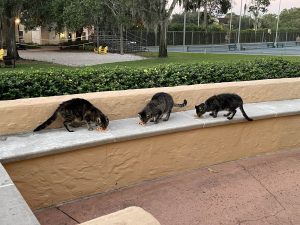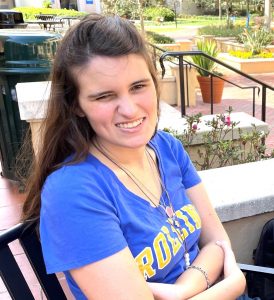Students experience bias within classroom atmosphere, dining options
After experiencing antisemitic behavior at Rollins, Jewish student Karen Gutensohn (‘22) is leading the charge to improve bias incident reporting structures and promote non-discrimination on campus.
Student Experiences
Gutensohn is an environmental studies major with a double minor in Jewish studies and Middle Eastern and North African (MENA) studies. In Fall 2019, Gutensohn was enrolled in a course taught by Dr. Stephen Day titled Global Citizenship and Human Migration.
Gutensohn said that Day consistently berated her in class and graded her papers more harshly than her peers’. She also said that two other students, who are not Jewish, noticed the difference in the way she was treated.
“I never explicitly told him I was Jewish,” said Gutensohn, who is also president of the Rollins chapter of Hillel, a Jewish campus organization. “I just wear my necklace [a Star of David pendant], and my last name is Gutensohn. It’s really not that hard to figure out.”
Gutensohn chose to write about the Israeli-Palestinian conflict for a class paper. Day provided sources for the assignment, which she used, but when she got the paper back, she saw that Day had marked the pages and claimed that she had written a biased report. He had given her a lower grade than other students who chose the Israeli-Palestinian conflict as their topic.
She also recounted an exchange after they handed their papers back to Day:
“We gave our papers back, and in the middle of class he stopped lecturing, and he was lecturing at me specifically, saying that I really need to think about what Israel is because they’re a genocidal state and they’re trying to get rid of everybody,” said Gutensohn.
Day declined to sit for an interview with The Sandspur, but has published a statement here.
After several incidents in which she felt targeted, Gutensohn told Dr. Yudit Greenberg, director of the Jewish Studies program, and Emily Block, the associate director of Jewish Student Life and Hillel’s staff advisor, about her experiences. Two non-Jewish students also went to Greenberg and described how anti-Israel and antisemetic sentiments were expressed verbally in the course.
“This past academic year, three students approached me with complaints about biases experienced in their International Affairs classes at the Holt School,” said Greenberg. “They were also uncomfortable with course content presenting imbalanced views of the Arab-Israeli conflict with biased views against Israel, and they felt that they had been criticized and made to feel uncomfortable for expressing their views.”
Greenberg then organized a meeting between herself, Gunter, Block, Gutensohn, and the two students to talk about the biases they experienced.
After the meeting, Block spoke with Gunter to help prepare him for a conversation with Day. Block addressed a comment Gunter made, which stated that professors sometimes use moments of discomfort as a pedagogical tool to help students think critically.
“There’s a difference between creating moments of discomfort in a classroom and making students feel singled out,” said Block. According to Block, Gunter seemed to agree with her.
“I think Dr. Gunter was really looking to understand what had happened,” said Block.
Gunter declined to sit for an interview with The Sandspur, but he gave the following general statement:
“The International Affairs Program found no evidence of bias, let alone antisemitism. Extensive reviews of student evaluations revealed the same. In fact, what stands out is Dr. Day’s noted peer-reviewed publication record as well as complimentary student teaching evaluations dating back to 2007. That said, we look forward to continuing constructive dialogue on such challenging, controversial, and important issues.”
In addition to in-class intolerance, Gutensohn said that Jewish students have requested that kosher options be provided in the campus center dining hall, but that Dining Services has denied those requests. Requests from students who keep kosher to be taken off the meal plan so they can buy their own groceries have also been denied.
The absence policy is another point of concern for Gutensohn, since the current policy allows professors to decide what counts as an excused or unexcused absence. Students are also required to tell professors what days they will need off before the end of the add/drop period.
“This is unacceptable, as both Jewish and Muslim holidays follow a different calendar and happen at different times every year … A new policy has been written and it is inclusive, but it has not been passed and would not go into effect until it is passed by the faculty,” said Gutensohn.
Gutensohn also expressed frustration with the college’s response to antisemetic incidents, both on and off campus, and she feels that the responsibility to prevent and respond to antisemitism is all too often placed on the Jewish community.
“While I do know a lot about antisemitism and Jewish life and I am able to answer questions, personally, I don’t think it should be solely the responsibility of the Jewish community,” said Gutensohn. “In the past few years, there have been shootings at synagogues, and it seems that it is us spreading services and mourning and not really Rollins coming together.”
What is “New Antisemitism”?
Greenberg, an acclaimed scholar in the field of Jewish studies, reflected on students’ reports and about contemporary forms of antisemitism.
“It’s not about criticizing the Israeli government. Demonizing Israel without providing balanced views of other countries and delegitimizing Israel’s right to exist crosses the line from fair criticism to what experts call a new form of antisemitism,” said Greenberg.
Block shared a similar sentiment: “So often, when we think of antisemitism, we think of more extreme instances or acts of violence, destruction of property, threat of life … and while that is obviously antisemitism, that is an extreme side of the spectrum,” said Block.
Block emphasized the importance of focusing on “micro-antisemitism,” including the dangers of dog whistles and stereotyping. She stressed the need to educate students on the history of antisemitism.
“I find that the majority of these incidents are not out of hate but out of ignorance,” said Block.
The Anti-Defamation League (ADL), an organization dedicated to ending defamation of the Jewish people, published a press release in May 2020 calling on college officials to respond to antisemitism on college campuses more effectively.
Jonathan A. Greenblatt, CEO of the ADL, said, “At a time when antisemitism in the US has spiked to historic levels and against the backdrop of COVID-19, which has revived old anti-Jewish conspiracies, college presidents and university administrators should take steps to prevent this prejudice from violating norms on campus and diminishing the educational experience of these students.”
Greenberg and Block said that while they received training on LGBTQ+ allyship and Title IX and Clery Act reporting, they did not receive training on how to respond to bias incidents that did not fall under those categories. Both expressed a desire for clearer, more explicit training on preventing and responding to biases to be required for faculty and staff.
Next Steps
After The Sandspur began its investigation of these issues, a meeting was called that included students impacted by antisemetic incidents–including Gutensohn–President Cornwell, Greenberg, and Block, as well as other key members of the college’s administration, faculty, and staff.
“I felt the administration’s sincere desire to support and actively listen to all of the students who were involved,” said Block. “As well as their commitment to ensuring that the proper procedures and policies are in place so that all students are able to engage in positive and equitable learning experiences.”
Gutensohn felt less optimistic; while she initially felt heard by the attendees of the meeting, she left the meeting without a clear understanding of what the administration’s next steps would be.
“I am not looking to get anyone in trouble or to create an atmosphere where people can’t disagree on things. I don’t want Day to get fired; I want steps and policies to avoid this in the future,” said Gutensohn.
Block said, “In my experience, there hasn’t been clear processes between Student Life and academia. I’m very appreciative that I was included in this specific incident and support Ren.”
Block advocated for clearer processes for addressing bias incidents and issues of discrimination, which would create cohesion between Student Life and academic affairs.
Abby Hollern, director of the Center for Inclusion and Campus Involvement (CICI), is a member of the Bias Incident Response Team (BIRT) at Rollins. The BIRT is responsible for addressing bias incidents on campus, but since most bias incidents are not required to be reported under the federally mandated Clery Act or Title IX regulations, reporting is mostly voluntary.
“We send out notifications of the BIRT each semester, and we try to do that around the third week; at the beginning in orientation we mention it, but I know that students are so overloaded at that time, I know not everything is sticking,” said Hollern.
When an incident is reported to the BIRT, Hollern reaches out to the community member who was impacted by the incident and works to understand how to address it, first by providing support to the person who has experienced harm, and later by looking at larger campus policy.
CICI is currently updating its website to include clearer information on the BIRT, including a new reporting form that can be used by any member of the Rollins community.
“When I think about the instances we talked about today, what stands out to me the most is that students don’t always know where they can find an advocate or an ally, and our office is here for that,” said Hollern. “If we can serve as a connector, I hope we can do that. Every colleague wants our students to have a positive experience and we want every student to be cherished. If we aren’t learning, we are messing up. We are learning to say sorry.”














[…] write in reply to a deeply misguided article, “Instances of On-Campus Antisemitism Spark Dialogue,” published by The Sandspur on October 16, 2020. The Sandspur quoted Rollins College student Karen […]